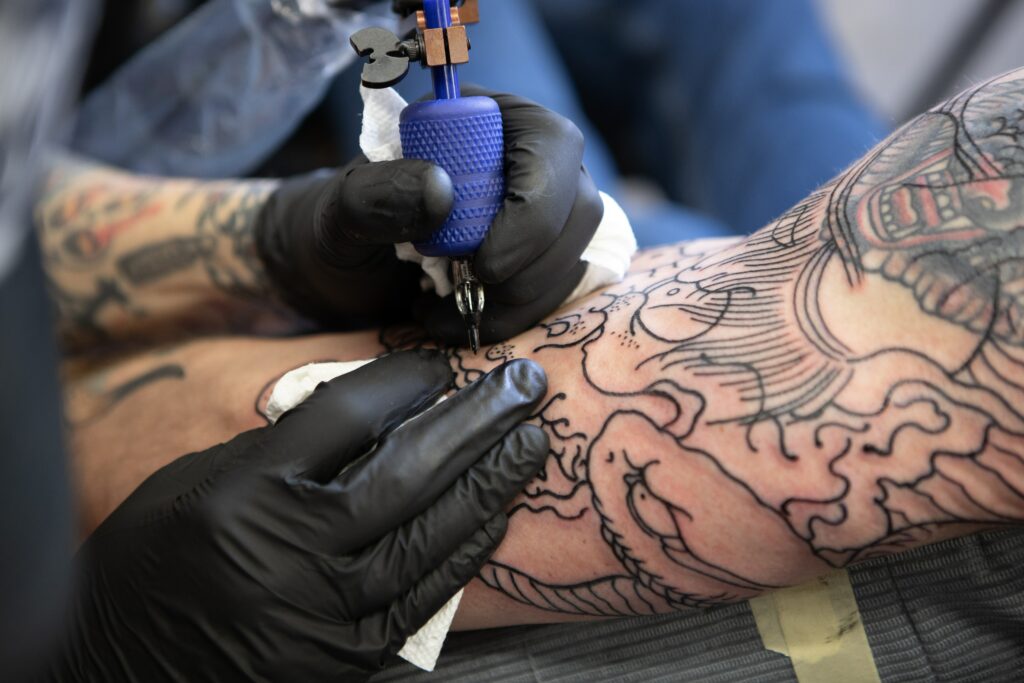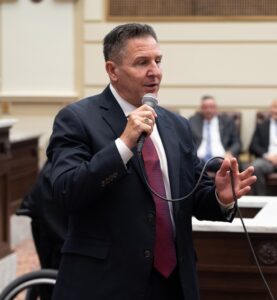The Oklahoma State Department of Health recently sent emails to proprietors of tattoo shops stating the need “clarify requirements and prohibitions from Title 21 Section 842.3.”
Title 21 in the Oklahoma State Statutes deals with licensing. Section 842.3 specifically deals with tattoo and body piercing licenses.
However, two of the “requirements” were ruled unconstitutional by Oklahoma County District Judge Daniel Owens in May 2007.
The first is Title 21 Section 842.3 (A) (14), which requires the posting of a surety bond in the amount of $100,000. The second is Title 21 Section 842.3 (C), which prohibits an initial license being issued to a body piercing or tattoo facility located within one thousand feet of a church, school, or playground.
Tattooing was banned in Oklahoma in 1963, purportedly due to concerns about the rising number of hepatitis cases, although urban legend has it that a legislator’s daughter got one and the father was angry and subsequently pushed for legislation to ban the practice in Oklahoma.
Nearly a decade later, tattoos and body piercing were made legal. On November 1, 2006, a bill was signed into law legalizing getting tattooed or pierced, along with regulations meant to promote public health and safety. It should be noted that Oklahoma was the last state to legalize tattooing.
Fast-forward to February 2007 when Tony Garcia, owner of A Different Image Tattoo and Art Studio in Oklahoma City, along with a number of other plaintiffs, petitioned for a declaratory judgment after he was denied a license since his shop was less than 1,000 feet from a school, and the fact he was unable to post the required $100,000 surety bond.
The defendant was Micheal Crutcher, M.D. “in his capacity as Commissioner of the Oklahoma State Department of Health.”
Judge Ownes ruled that the two statutes “are unconstitutional as applied and on their face under the rational basis test, and their enforcement should be permanently enjoined.” What this means in layman’s terms is that the Judge issued a permanent injunction against enforcement of those two rules.
The Sapulpa Herald spoke to some local tattoo shop owners.
Brandon Mull, owner of Water Street Tattoo, addressed the issue:
“They can’t just change the rules and try to enforce something that has already been ruled on in court. Anybody who knows anything about the court knows that is not how it works. Case law is case law. Take Row Vs, Wade, it took the Supreme Court to take it down, nobody has ruled on this. I can’t find anything from this court case that has changed, which means it is still in force.”

They say they (OSDH) are going to review things, but it doesn’t matter, you can do it all you want, If it has already been overturned in court, there is nothing you can do about it unless you go to court and take steps that way, and they have not done that.”
When speaking about the surety bond, Mull said, “I have a three-and-a-half million dollar insurance policy against my business. That is 30 times that little surety bond they are talking about. I have gone way above their needs for protecting the community.”
The next shop owner to be interviewed was Clabe Risingsun, owner of Cat and Dagger Tattoo.
When referring to the 1,000 ft prohibition, Risingsun said:
”I feel like it is completely unjustifiable that they are doing it, because it is pretty much the sanctioning of tattooers and shops as the same level as sex offenders. It feels judgmental, discriminatory, we are not selling drugs, or selling alcohol, it is the same law sanctioning dispensaries and bars.”
Risingsun talked about the moral stigma sometimes attached with tattoos: “I would say that a good 70 to 80 percent of my clientele are churchgoers, or they are heavily influenced or heavily associated with churches.”
Eric and Cat Poland, owners of Electric Eye Tattoo, spoke to the Sapulpa Herald about the recent email.
“In 2012 my wife and I had to hire the same exact attorney, we had another shop on 15th St. in Tulsa, the Health Department tried that exact same thing again. We were 940 feet from a playground back in a neighborhood. We found the original attorney, Jaye Mendros was her name, (Jaye Mendros represented the plaintiffs in 2007), she gave them an ultimatum, it took them several months, but they finally backed off of it.
It looks like we are going to have to do this thing all over again.”
The original email stated that shops must be in compliance by July 1, 2023, but a subsequent email said that had been delayed until November 1,2023.
The Herald reached out to the OSDH, but did not receive a timely response.










